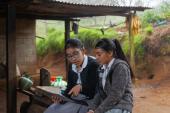Blog post
The future in the making: auditing the education sector

Public Policy in a Rapidly Changing Context
The public sector increasingly understands the value of partnerships, co-creation and platforms. In the coming years, the education sector will encompass participatory tools enabled by digitalization to reshape service delivery models as well as legislative and regulatory processes. Control, accountability and evaluation mechanisms will accordingly follow and adapt to these new trends.
In the current VUCA (volatile, uncertain, complex and ambiguous) context, public servants face rapidly changing demands on policy-making, and calls to innovate. The digitalization of government operations and the emergence of new audit tools require public auditors to build new methodologies and create new work processes. There is a need to create agile and open professional networks to update and widen the professional understanding of the new normal. The future-proofing of audit is best tackled by multidisciplinary teams benefiting from the know-how and experience of others.
Future of Workforce 2030 Parallel Audit
The European Organization of Supreme Audit Institutions, EUROSAI, brings together more than fifty public external audit offices to share best practice and improve cooperation. The Finnish National Audit Office recently participated in a parallel audit on the future workforce, a EUROSAI project led by the Supreme Audit Institution of Israel. The audit examined whether basic education supports the teaching of skills necessary in working life (e.g, social and emotional skills, and the ability to learn), which in turn impacts Finland’s future competitiveness, national economy, and central government finances.
The EUROSAI parallel audit on the Future Workforce is a good example of how open international networks contribute to the work of national institutions, and highlights the benefits of international networks in addressing emerging issues in public policy. By 2030, automation will have affected more than 400 million individuals, creating the need to find new jobs, however, technological and demographic changes also will create opportunities:
While it is difficult to try and plan in detail for the potential changes that might affect the world of work in years to come, it is crucial that countries strengthen the resilience and adaptability of labour markets so that workers, organizations and businesses can manage the transition with the least possible disruption, while maximising the potential benefits.
The compendium of the EUROSAI parallel audit will be published in 2021. The Finnish audit recognized that that skills needed in the workforce were a key element of the 2014 comprehensive reform of the Finnish core curriculum, and the conclusions focused on the need to further develop steering mechanisms and digital toolkits.
Digitalization and Artificial Intelligence call for Foresight
Public auditors are making the move from oversight and insight to providing foresight in support of public policy decision-makers. As financial management systems evolve and integrate automated controls, auditors’ focus will increasingly be on systems and organizational culture. Auditing the education sector requires a long-term perspective and a good understanding of the changing landscape of societal needs and digital tools.
Digitalisation, deep learning and Artificial Intelligence both enable and are the subject of evidence-rich audits. Policy coherence calls for answers to the question of ‘Were the right things done?’ rather than ‘Was it done right?’. An example of this is the role of ethics in AI policy. Questions around ethics need to be discussed well in advance of the implementation phase of AI-based systems.
Holistic approach to policy impact
Many Supreme Audit Institutions are increasingly developing a more citizen-participatory approach to auditing, engaging actively with stakeholders and listening to the needs of public service users. However, these rapid changes in the operating environment cause difficulties from a compliance perspective; when legislation becomes obsolete. Legislation has a natural lag – it is based on past values and past context. Auditors can support a systems’ approach to compliance and better guide sustainable public sector development, by focusing on the root causes rather than a particular flaw or detail.
The United Nations Sustainable Development Goals (SDGs) set the bar high for public sector actors in integrating a more holistic perspective into designing, delivering and measuring policy impact. The OECD Recommendation on Policy Coherence for Sustainable Development recognizes the need to address ‘silos’ and create inclusive mechanisms to address policy interactions across sectors and align actions between different levels of government.
From linear thinking to systems’ thinking
The complexity and inter-connectedness of political issues call for a renewal of the present structures and operating models in public sector governance. Linearity and strict sectorial specialization should be replaced by a more resilient, network-based approach, allowing for policy coherence and cross-sectoral continuity. Klaus Schwab, the founder of the World Economic Forum states that decision-makers are too fixated on traditional linear thinking. Their time is spent on constant crisis management. They, therefore, lack the time to think strategically about how the forces shaping our future will impact our operations.
J. Peter Scoblic, in his research on strategic foresight, has highlighted the need for continuous strategic thinking and scenario planning, making a case for ‘institutionalizing imagination. According to Scoblic, in a continuously changing unpredictable operating environment, organizations should establish processes that ‘allow top managers to build permanent but flexible bridges between their actions in the present and their thinking about the future.’
Technological innovations impact the whole of society. Auditors seek to add value to society through supporting the continuous development of public administration. The public external audit function is important for the development of public education systems from two viewpoints: providing accountability and giving insight as a basis for continuous improvement through recommendations that address the potential for change.







07.01.2022